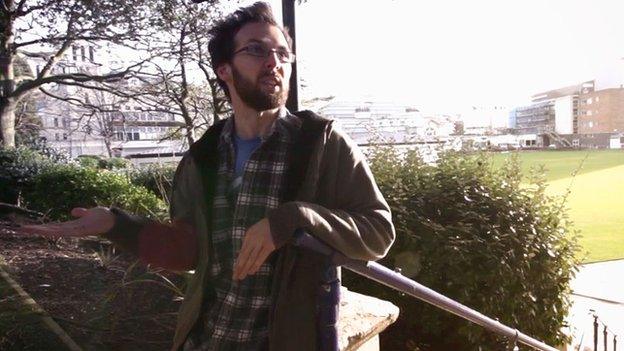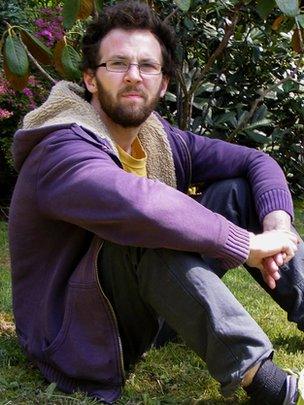Young people explain psychosis on film
- Published

In a new YouTube video by 25-year-old filmmaker John Richardson, he and two other young people recount their personal stories of psychosis and the help they received from a mental health service for young people where they live in Sussex.
"I was speaking a million miles an hour to my friends about thousands of different topics," says Richardson in the film, saying he had paint and coffee stains all over him, and had written words up and down his arms.
We then see a young man, Dominic, who believed he was Jesus and later a young woman, Jo, who talks about the troubling agreement she made with her hallucination. She says: "We made a deal that he could be with me when I killed my friends and family." She believed at the time that carrying out this act would save the people she loved from an even worse fate.
The film explains the kind of help and understanding they received from the early intervention service, a team dedicated to helping young people. Richardson says he made the film Simon Says: Psychosis because it's the one he would have wanted to have seen when he became ill. Instead, he says he spent two years jumping out of windows and hiding to avoid discussing his mental health with the team.

John Richardson spoke to Ouch this week:
What was your first experience of psychosis?
I was fed up with my film course and felt unfulfilled, so I started getting all these ideas of films I could make in the summer and it snowballed into a bit of a psychotic episode. I couldn't sleep and was running around the town, filming everything and talking to my Dictaphone. A friend got my mum up from Eastbourne and she found me lying in glass that had accumulated over five days of me breaking stuff. To anyone in a normal state of mind, it just looked like a mess, but to me, in that moment, I was arranging it into some sort of intricate piece of art. I thought that if someone could work it out, they'd glimpse what kind of state I was in. I still have all the footage, which is quite disturbing.
When did the early intervention team get involved?
They came the fourth day I was in hospital... but I wasn't open to help. I think most people have that engagement issue, where they don't feel there's anything wrong with them or they don't feel like the people who are saying that they can help, can actually help. They just don't trust them. The team increased my positive outlook on life. They changed the way I think about hope. Rather than it being that the world's going to blossom into rainbows and flowers, it's that I can find some hope in myself and be a bit stronger in the future. They armed me with the tools that I need to stop similar things happening to me again.
How does your film differ to any other mental health films you've seen?
For a start, we don't have any manipulative, emotional piano. We tried to make it as honest as possible and not too much like a glorified advert. I'm a cynic so I look right through that "this service is amazing" stuff and see it as a lie. It is nice for people to see that the clinicians are actually people and have personalities too. The first thing professionals should do is strike up a relationship in a humane way, something like "what's your favourite colour". It is easier to form a therapeutic relationship if you can relate to them as a person.
You can watch the film Simon Says: Psychosis here, external
Follow @BBCOuch, external on Twitter and on Facebook, external, and listen to our monthly talk show